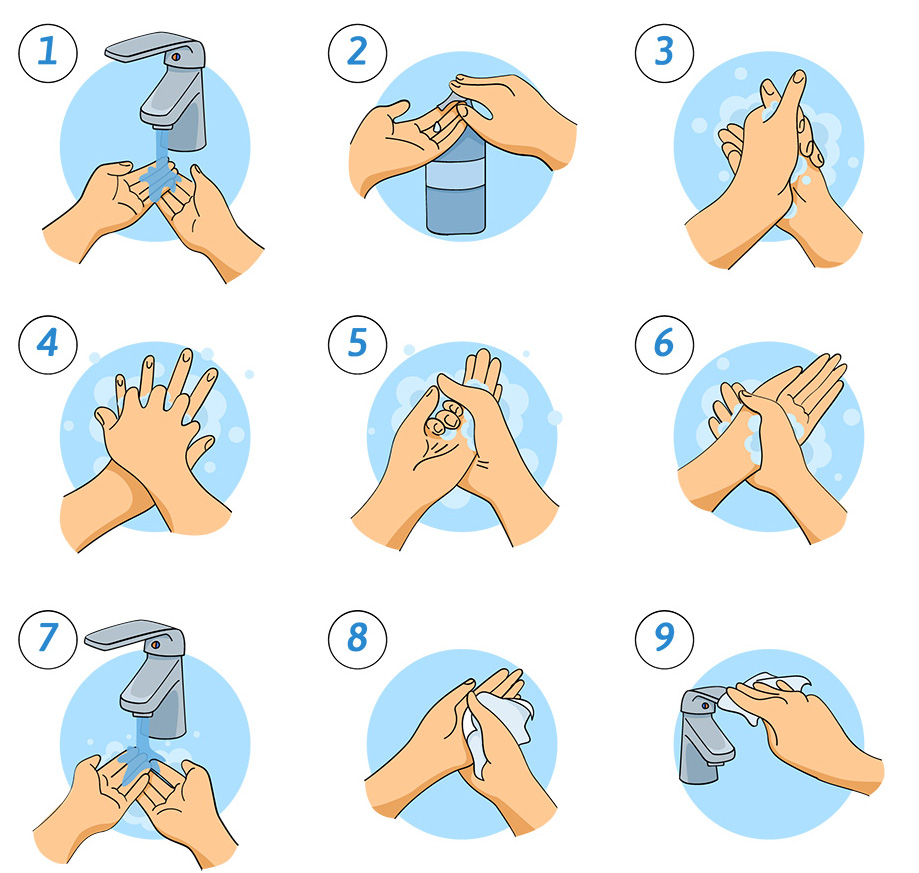Patient and Caregiver Community Resources
Preventing Infections
Keeping your hands, infusion supplies, and infusion workspace clean is a very important step in preventing an infusion-related infection. Good handwashing techniques can also help prevent many other common illnesses.
Handwashing

When you should wash your hands
- Always wash your hands before handling your infusion supplies
- Before, during, and after preparing and eating or drinking
- Before and after caring for someone who is sick
- Before putting on or removing contact lenses
- Before treating a cut, scrape, burn or blister
- After using the restroom or helping someone to use the restroom
- After touching garbage
- After touching and animal or cleaning up animal waste
- Any time your hands are visibly dirty or greasy
How to wash your hands properly
- Wet hands with clean running water
- Apply regular soap (antibacterial is not necessary)
- Rub your hands together, being sure to scrub all surfaces including palms, backs, fingers, between fingers, and under nails for 20 seconds
- As a reference, saying the ABC’s is about 20 seconds
- Rinse hands with water thoroughly
- Dry your hands with a paper towel and use the same paper towel to turn off the water and open the restroom door
- If you are using an alcohol-based hand sanitizer (should contain at least 60% alcohol), apply it to the palm of one hand and spread the product over all surfaces of the hands and fingers until they are dry
- Additional handwashing information can be found at cdc.gov/handwashing
Keeping your equipment and supplies clean
It is particularly important that you keep your infusion equipment and supplies clean and away from anything that could contaminate them.
- Store your supplies in a bag or sealed bin in a clean and dry space off of the floor
- Keep your equipment and supplies away from children and pets
- In the refrigerator, place your infusion medication in a designated clean area away from food
- Clean your pump with a damp lint-free cloth if it becomes soiled
- Sterile supplies such as needles and tubing ends should come in a sealed package
- They contain protective covers which keep them sterile during handling
- Avoid letting a sterile item touch a non-sterile item
- If this happens, discard the contaminated item and use a new sterile item
- If a sealed package has been damaged or opened prior to use, please discard it. Contact your UC Davis Health at Home – Home Infusion representative for replacement supplies
- Always clean insertion ports with an alcohol swab
- Keep your dressing change appointments
Selecting a clean work area for your infusion
- Select an area in your home that is free from drafts, visible dirt, clutter, and distractions
- Avoid using the bathroom and space near a kitchen sink because these areas are often contaminated with germs
- Select a level, smooth, and nonporous table, countertop, or tray that can be cleaned and disinfected
- The best surface choices are metal or plastic
- Select an area that has enough space and good lighting
- Place a waste basket nearby to keep clutter away from the work area
- Keep pets out of the area during catheter care or medication preparation
Advocacy resources
Agency on Aging/Area 4
1401 El Camino Ave., 4th floor
Sacramento, CA 95815
916-486-1876
California Department of Aging
2880 Gateway Oaks Drive, Suite 200
Sacramento, CA 95833
916-419-5000
California Department of Aging: Center of Independent Living
916-419-7500
California Protection and Advocacy, Inc.
1300 Ethan Way, Suite 105
Sacramento, CA 95825
1-800-806-1191
California Department of Ageing: Aging and Disability Resource Center
The California Department of Aging (CDA) administers programs that serve older adults, adults with disabilities, family caregivers, and residents in long-term care facilities throughout the State. These services are provided locally by contracted agencies. This webpage is intended for those who provide, or seek to provide, Aging and Disability Resource Connection (ADRC) services.
